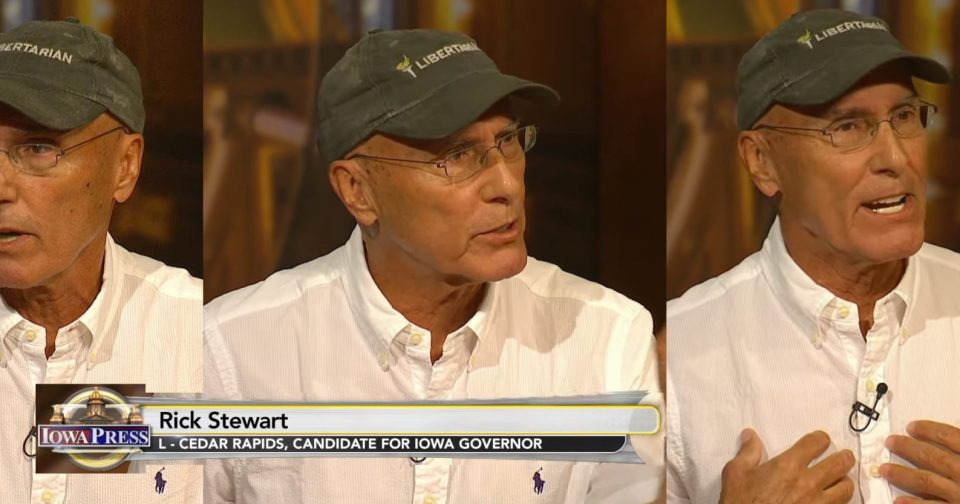Coming off a week of 8+ hour days shaking hands and meeting voters at the Iowa State Fair and parades across Iowa, Libertarian Party candidate for governor Rick Stewart got a rare opportunity for our party – a 30 minute interview with Iowa Press on PBS. He was primed and in peak performance, and we think he hit it out of the park.
In fact, he did such a great job that we would be remiss if we didn’t leverage his performance as a valuable teaching moment to other Libertarian Party candidates. The fact is that the interviewers didn’t pull their punches, and lesser candidates may have run head-first into various traps. In this post we would like to call out how Rick Stewart made us proud by giving both principled libertarian positions and common-sense transition roadmaps, all the while being charismatic and persuasive.
The worst possible mistake a libertarian candidate can make is to abandon his libertarian principles to chase the siren song of pragmatism. Without naming names, we can think of candidates that attempted this tactic and ultimately failed twice: they did not win the election, and they did not get out the message of libertarianism. Thankfully, Rick Stewart kept his libertarian purity card in outstanding order during this interview.
When they asked Rick about ending the drug war, he did not lighten his position to only marijuana, but gave a slurry of fact-based arguments for the decriminalization of all drugs, specifically calling out psychedelics and opioids. Throughout the interview he gave principled libertarian positions on eminent domain, decentralization, nullification, abortion, public education, ending the income tax, and a clear and unambiguous statement opposing all medical mandates and supporting full bodily autonomy. The interviewers even challenged Rick on the practicality of privatizing Iowa’s roads and bridges. In characteristic fashion, Rick gave a common sense anecdote of how improved technology could easily allow Iowa to transition from a fuel-tax-funded government-run system to leasing the roads to private companies that would take better care of the roads while making a profit. Walter Block couldn’t have said it better.
When libertarian candidates pass the “purity test” the next pitfall to be avoided is to be perceived as being so stuck in your libertarian theory that you don’t live in the real world. Libertarian podcaster and possible 2024 presidential contender Dave Smith has made this very criticism of libertarians so trapped in Ancapistan that they are unable to grasp that while “A” can be the libertarian ideal, we can still say that “B” is preferable to “C”. Throughout the interview Rick moved seamlessly from explaining the libertarian ideal to how his common-sense approaches could realistically be implemented by a libertarian governor.
In one of the final exchanges, Rick uses this very technique to clarify his position on a Universal Basic Income. Rick set the stage by saying we have three options. Option 1 is to keep doing what we are doing, a complete mess, with a hodgepodge of individual benefit programs, laws and regulations. Option 2, speaking to his libertarian base, is to get rid of all welfare, which he clarifies is his position. He then acknowledges that because we are stuck with the current system of government funded welfare, replacing it with a universal basic income would be preferable.
It was this exchange on Universal Basic Income where Rick demonstrated his mastery of various persuasive techniques, giving his positions the air of inevitability. Casually and confidently, he repeated that his positions would eventually happen, maybe not today, maybe not next year, but eventually they would happen. When an outcome is positioned as inevitable, it speaks to our desire to be on the wining team, but also to just rip off the Band-Aid and get it over with.
Rick used this technique in his earlier defense of legalizing therapist supported psychedelics. Rick stated that they would be legal in the next year or two (appeal to inevitability), he brought up the statistic of 25 veterans committing suicide every day (appeal to emotion and patriotism), and ended with a call to action that it would be wrong to wait another single day to deny a known cure to our veterans.
In our admittedly biased opinion, Rick Stewart came off as confident, informed, funny, and respectable. He masterfully walked the tight rope of appeasing his hard-core libertarian base while also making specific policy recommendations that would bridge the gap from the real world of today towards a better tomorrow. We thank Rick Stewart for the incredible example he has set, not only in his positive attitude and his tireless work ethic, but now also with this master class of how to conduct a near-perfect interview.


